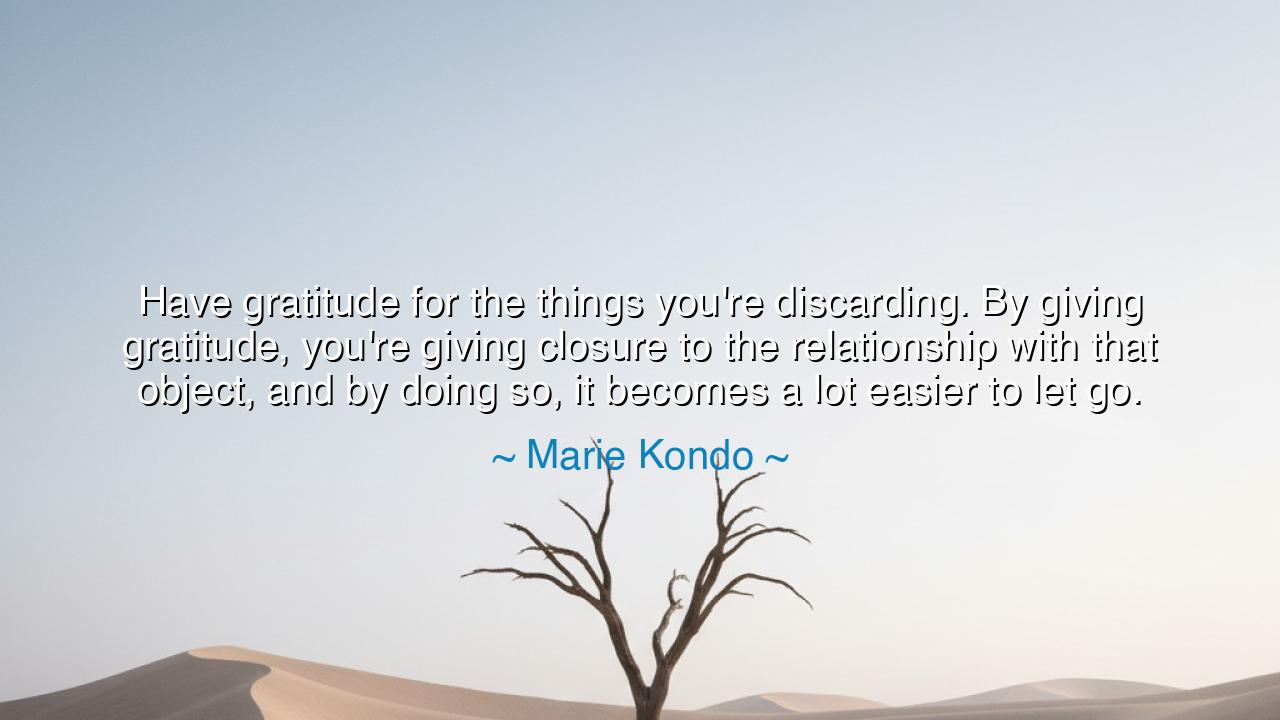
Have gratitude for the things you're discarding. By giving
Have gratitude for the things you're discarding. By giving gratitude, you're giving closure to the relationship with that object, and by doing so, it becomes a lot easier to let go.






The gentle sage of order and simplicity, Marie Kondo, once spoke with luminous clarity: “Have gratitude for the things you’re discarding. By giving gratitude, you’re giving closure to the relationship with that object, and by doing so, it becomes a lot easier to let go.” In these words she unveils a sacred wisdom—that even in the smallest acts, such as parting with a belonging, lies an opportunity to practice reverence, humility, and release.
For every object carries a story. The cloak once worn, the book once read, the cup once held—these are not lifeless things, but companions of a season, vessels of memory, witnesses of joy and sorrow alike. To cast them aside without gratitude is to deny their role in shaping our journey. But to pause, to bow in thanks, is to honor their service and to free both the object and the heart from clinging.
Kondo speaks of closure, that deep human need to end one chapter before beginning another. By blessing what we release, we heal the invisible bond between ourselves and the object, just as we honor a friendship that has reached its end. Without this act, the heart resists, hoarding not only clutter but also fear and guilt. Yet when gratitude is spoken, letting go becomes not loss, but liberation.
This wisdom is not merely about tidying homes, but about the larger rhythm of life. Friendships, loves, ambitions, and even past selves—all require gratitude when their season has ended. To part in bitterness breeds chains; to part in gratitude brings peace. Just as the ancients honored the harvest before winter, so too must we honor what has served us, even as we release it.
So let this teaching be preserved: when you discard, do not despise. Whisper thanks, and let gratitude be the bridge that turns loss into blessing. In this way, every act of letting go becomes an act of renewal, and the heart is made light enough to embrace what comes next. For the soul that honors the past is the soul most ready to walk into the future.






VHDo Vu Hoang
This concept of closure is intriguing. What does it mean for something to be 'discarded' in a meaningful way? How do you differentiate between holding on to something out of love versus just because it feels hard to let go? I feel like this could help people emotionally detach from objects that no longer serve them, but is it something that requires practice or is it instant?
VTLe Vu Tam
Marie Kondo’s quote really resonates with me, especially in a society that encourages keeping more and more things. But can practicing gratitude really change how we feel about discarding? What if someone struggles with the idea of saying goodbye to items? How do we find that closure without feeling wasteful or ungrateful for the items we once cherished?
XTxinh trai
It’s amazing how much attachment we have to objects. I’ve never thought about showing gratitude when I get rid of things. Does this idea of closure really make the process easier? I can see how it would, but I wonder if the feelings of attachment are too deeply ingrained to be released by gratitude alone. Is there a deeper psychological reason behind why we cling to these items?
DNLe Danh Nhan
I love the idea of giving gratitude to things you’re discarding. It feels so positive! But how can we be sure that this 'closure' doesn't make us hold on to things longer than we should? Do we end up holding on to objects just to avoid feeling guilt or regret? I’m curious if this really helps with letting go or if it just delays the inevitable decision.
HTTuan Hung Tran
Marie Kondo's approach to letting go of things is so refreshing. I’ve always found it hard to part with items that hold sentimental value, even if they no longer have a function in my life. I wonder if this practice of gratitude can make the process less emotionally painful. Can this philosophy be applied to relationships too, or is it limited to material objects?